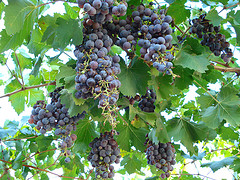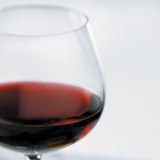Clearing up the Confusion on Organic Wine
First and Foremost organic wine is wine made out of grapes
that were grown organically.

Organic wines are produced using organically grown grapes.
No pesticides, herbicides, fungicides, chemical fertilizers, or synthetic chemicals of any kind are allowed on the vines or in the soil.
Strict rules govern the wine-making process and storage conditions of all imported and domestic wines that acquire certification. In addition, organic winemakers often avoid many of the chemical substances used to stabilize conventional wines.
CLICK HERE TO SEE THIS GREAT ORGANIC COMPANY
There is interest but much confusion about organic wine these days. The interest stems from the increasing presence of wines with organic claims on store shelves and from wine consumers who want organic alternatives to conventional wines. Most of the confusion has to do with the labels of these wines.
Wine - the key to a longer life?
It's a well-known fact that a glass or two of wine a day can do good things for your health. Now scientists are a step closer to figuring out why.

Wine - A Part of a Healing Diet?
Naturally fermented wine is more than an alcoholic beverage. It is a complex biological fluid possessing definite physiological values. Records back dating back 4,000 years refer to the dietary and therapeutic uses of wine. It has been used as a food, medicine, as part of various religious ceremonies and as an important element in social life.
CLICK HERE TO SEE THIS GREAT ORGANIC WINE COMPANY
Wine is still living food, and can combine, and aid, the body like yogurt or other fermented foods. Many small, family owned wineries make chemical and additive free wines that retain inherent nutrients, including absorbable B vitamins, minerals and trace minerals, such as potassium, magnesium, organic sodium, iron, calcium and phosphorus. Wine is vastly more complex product than beer or spirits; it is never boiled, so its biologically active compounds are not destroyed or altered by heat.
Wine – What is it Good For?
Wine is a highly useful drink for digestion, and in moderation, is a mild tranquilizer and sedative for the heart, arteries and blood pressure. Wine can free circulation, relieve pain and reduce acid production in the body.
Research indicates that drinking one or two glasses of wine per day can cut coronary heart disease risk by 50%, help prevent blood clot formation, and increase the life span by reducing stress. Wine raises high-density lipoproteins (HDLs) in the blood, while decreasing low-density lipoproteins (LDLs) to help lower dangerous cholesterol levels.
Recent studies at U.C.Berkeley have shown that Red wine contains a compound called resveratrol and is rich in the new class of polyphenols, powerful antioxidants that help neutralize free radicals, which damage DNA, alter body chemistry and destroy cells outright.
The researchers think that resveratrol works its magic by helping to stabilize DNA and keep it from getting damaged.
DNA damage is one of the major factors that have been implicated in the ageing process. So it's possible that resveratrol might not only lead to a longer life, but also to a healthier one. If you don’t drink wine, Life Extension* offers a product rich in resveratrol.
This is the place where I get most of my supplements - *See Note Below.
A study found that among 15 varieties of red organic wines had the greatest concentrations of antioxidant activity and of the key antioxidant resevatrol.

LEARN HOW TO READ LABEL ON ORGANIC WINE BOTTLES
There are four categories that Wine Companies CAN CLAIM:
- 100% Organic
- Organic
- Made With Organic Ingredients
- Some Organic Ingredients
Today, these categories define organic wine so understanding the differences between these four categories is important if you want to know what you are really buying.
Grape growing like most other farming is organic by origin, but like most other farms, most vineyards today are not organic.
For a wine to be labeled “100% Organic” and bear the USDA Organic Seal, it must be made from 100% organically produced ingredients (in other words, the grapes must be grown organically), have an ingredient statement on the label, and give information about who the certifying agency is. A wine in this category cannot have any added sulfites. It may have naturally occurring sulfites, but the total sulfite level must be less than 100 parts per million.
To be labeled “Organic” and bear the USDA Organic Seal, the wine must be made from at least 95% organic ingredients, have an ingredient statement on the label where organic ingredients are identified as being organic, and give information about who the certifying agency is. Again, a wine in this category cannot have any added sulfites, but it is allowed to have naturally occurring sulfites below 100 parts per million (ppm). The non-organic 5% must either be a non-organically produced agricultural ingredient that is not organically available or another substance like added yeast.
To claim any of these statements, a wine must be made with at least 70% organic ingredients, have an ingredient statement on the label where organic ingredients are identified as being organic, and give information about who the certifying agency is. A wine in this category may not bear the USDA seal. It may contain added and naturally occurring sulfites and the total must still be under 100 parts per million. The 30% of non-organic ingredients must be non-organically produced agricultural ingredients that are not available in an organic form or another substance.
This category is for products that have less than 70% organic ingredients. It cannot bear the USDA seal nor have information about a certifying agency or any other reference to organic content.
Click here for Facts on Organic Wine
Confused about Sulfites
Ok. What are sulfites anyway?
(This is part of the ingredients in wine consumers always question about.)
The public often equates organic wines with "sulfite-free" wines. This is inaccurate.
Sulfite or sulfur dioxide is used as a preservative in wines. It has strong antimicrobial properties and some antioxidant properties. The health effects or consequences of sulfites are debatable though a small percent of the population does suffer a sensitivity reaction to them.
Click here to find out more technical information on
SULFITES.
A wine can make the claim on their bottles stating:
Sulfite Free or No Added Sulfites or Contains Naturally Occurring Sulfites, but if sulfites are added and the total sulfites in the wine are above 10 parts per million, it must make the statement, “Contains Sulfites.”
A wine that makes the claim Sulfite Free MUST have NO detectable sulfites. There is some controversy about whether it is really possible for a wine to have no sulfites. No Added Sulfites means that the winery did not add sulfites to the wine but there may be naturally occurring sulfites in the wine that occur as a byproduct of fermentation.
Conclusion
According to the law, all organic claims must be stated on the label so you have to read labels carefully to know what is in the bottle. Also, be careful of the way that stores advertise and shelf the various wines. It may not be the same as what the bottle labels state.
Great Resources for Organic Wines:
For more than 200 years, the family has grown grapes and made wine on our St. Chinian property, Château Bousquette, in the South of France. In 1970, their grandfather, a retired professor of medicine, decided to devote his "Golden Years" to the family estate. He studied and experimented, seeking better, healthier ways of growing grapes and making wine. In 1972, he began cultivating our 50 acres of vineyards organically.
Long discussions with their grandfather, and our their dedication to the well-being of the earth, inspired their brother and the owner to act as ambassadors for organic wines. Therefore, nearly two decades ago, the owner founded Organic Wine Company, thus importing the first French organic wines into the United States.
Check out Frey Vineyards – Organic Wines that is grown in Mendocino County - The America's Oldest Organic Winery - No Sulfites Added
Frey vineyards, in Mondocino County, California, produces biodynamic, vegan wines free of GMO's (genetically modified organisms). We like their Cabernet Sauvignon.
Mendocino County leads nation in acreage devoted to grapes grown using certified process. Mendocino County has more certified organic wineries — 15 — than any county in the nation, making it home to more than a third of all certified organic vineyard acreage in California. It’s a trend receiving national attention, and its success is a combination of visionary winemakers and a climate and geology that makes Mendocino County an almost perfect environment for organic farming.
Winezap.com is a good destination for reasonably priced wines, with search capabilities and wines listed by category. Search for Wine
*Note: Life Extension the world’s leading anti-aging organization is dedicated to helping individuals take charge of their health. With their extensive range of premium grade vitamins and supplements at great value pricing, we offer life-enhancing products for almost any health concern. They have a wide variety of products can quickly be found though their easy-to-navigate web site.
I use Life Extension Supplement for all my needs. Durk Pearson and Sandy Shaw sell all their products thru Life Extension. A very well reputable company. I just love them.
Facts on Organic Wine



